| Listing 1 - 10 of 37 | << page >> |
Sort by
|
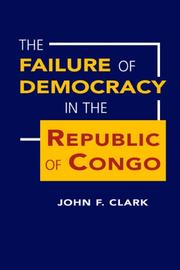
ISBN: 9781588265555 1588265552 Year: 2008 Publisher: Boulder, Colo. Lynne Rienner
Abstract | Keywords | Export | Availability | Bookmark
 Loading...
Loading...Choose an application
- Reference Manager
- EndNote
- RefWorks (Direct export to RefWorks)
Government --- Political systems --- Internal politics --- Congo-Brazzaville --- Democracy --- Democratization --- Démocratie --- Démocratisation --- Congo (Brazzaville) --- Congo --- Politics and government --- Politique et gouvernement --- Democratic consolidation --- Democratic transition --- Political science --- New democracies --- Self-government --- Equality --- Representative government and representation --- Republics --- Démocratie --- Démocratisation
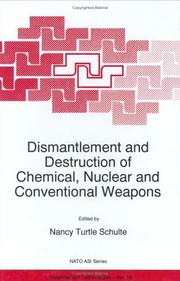
ISBN: 0792344707 9048148170 940171276X Year: 1997 Volume: 10 Publisher: Dordrecht Kluwer Academic Publishers
Abstract | Keywords | Export | Availability | Bookmark
 Loading...
Loading...Choose an application
- Reference Manager
- EndNote
- RefWorks (Direct export to RefWorks)
The end ofthe Cold War opened unprecedented opportunities for reductions in weapons of mass destruction. With these opportunities came new challenges, both scientific and political. Traditionally approached by different groups, the scientific, technical and political challenges are inextricably intertwined. Agreements to dismantle and destroy chemical, nuclear and conventional weapons, after having been negotiated via diplomatic channels, require the expertise of scientists associated with their development to determine the safest and most environmentally sound methods of destruction. It is in this context that representatives from sixteen countries and five international organizations were convened jointly by NATO, the Ministry of Foreign Affairs of the Federal Republic of Germany and the State Government of North Rhine Westphalia 19-21 May, 1996 in a meeting near Bonn to take stock of worldwide efforts to destroy and dismantle chemical, nuclear and conventional weapons remaining after the end ofthe Cold War. NATO support was provided under the auspices of the NATO Science Committee's Panel on Disarmament Technologies. The conference brought together the major actors involved in the dismantlement and destruction of chemical, nuclear and conventional weapons, highlighted the substantial accomplishments achieved in this area and pinpointed the remaining technical obstacles still to be overcome. It also underlined the critical importance of transparency, data exchange and verification as indispensable preconditions for disarmament and cooperative security.
chemische wapens --- ontwapening --- kernwapens --- Polemology --- biologische wapens --- Disarmament --- Congresses --- Arsenals --- Waste disposal --- Political science. --- International relations. --- Environmental management. --- Social sciences. --- Business. --- Management science. --- Environment. --- Political Science. --- International Relations. --- Environmental Management. --- Social Sciences, general. --- Business and Management, general. --- Environment, general. --- Quantitative business analysis --- Management --- Problem solving --- Operations research --- Statistical decision --- Trade --- Economics --- Commerce --- Industrial management --- Behavioral sciences --- Human sciences --- Sciences, Social --- Social science --- Social studies --- Civilization --- Environmental stewardship --- Stewardship, Environmental --- Environmental sciences --- Coexistence --- Foreign affairs --- Foreign policy --- Foreign relations --- Global governance --- Interdependence of nations --- International affairs --- Peaceful coexistence --- World order --- National security --- Sovereignty --- World politics --- Administration --- Civil government --- Commonwealth, The --- Government --- Political theory --- Political thought --- Politics --- Science, Political --- Social sciences --- State, The
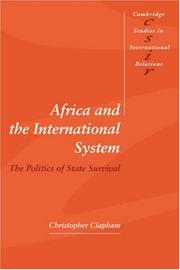
ISBN: 0521576687 052157207X 0511549822 9780521576680 9780511549823 9780521572071 Year: 2002 Volume: 50 Publisher: Cambridge Cambridge University Press
Abstract | Keywords | Export | Availability | Bookmark
 Loading...
Loading...Choose an application
- Reference Manager
- EndNote
- RefWorks (Direct export to RefWorks)
African independence launched into international politics a group of the world's poorest, weakest, and most artificial states. How have such states managed to survive? To what extent is their survival now threatened? Christopher Clapham shows how an initially supportive international environment has - as a result partly of political and economic mismanagement within African states themselves, partly of global developments over which they had no control - become increasingly threatening to African rulers and the states over which they preside. The author also reveals how international conventions designed to uphold state sovereignty have often been appropriated and subverted by rulers to enhance their domestic control, and how African states have been undermined by guerrilla insurgencies and the use of international relations to serve essentially private ends. He shows how awkward, how ambiguous, how unsatisfactory, and often how tragic, has been the encounter between Africa and Western conceptions of statehood.
Soevereiniteit --- Souveraineté --- Sovereignty --- Self-determination, National --- Sovereignty. --- Droit des peuples à disposer d'eux-mêmes --- Africa --- Afrique --- Foreign relations --- Relations extérieures --- -Sovereignty --- #SBIB:327.4H71 --- #SBIB:AANKOOP --- State sovereignty (International relations) --- International law --- Political science --- Common heritage of mankind (International law) --- International relations --- National self-determination --- Nationalism --- Nation-state --- Nationalities, Principle of --- Derde wereld en wereldsysteem, internationale relaties --- Law and legislation --- Eastern Hemisphere --- -Self-determination, National --- Droit des peuples à disposer d'eux-mêmes --- Souveraineté --- Relations extérieures --- International relations. Foreign policy --- Internal politics --- 1960 --- -Self-determination [National ] --- Social Sciences --- Political Science --- Self-determination, National - Africa --- Africa - Foreign relations - 1960
Periodical
ISSN: 00446483 14676338 Publisher: London
Abstract | Keywords | Export | Availability | Bookmark
 Loading...
Loading...Choose an application
- Reference Manager
- EndNote
- RefWorks (Direct export to RefWorks)
International relations. Foreign policy --- Economics --- Africa --- Politics and government --- Afrique --- Africa. --- Politique et gouvernement --- Arts and Humanities --- General and Others --- Conservation --- Archaeology --- Foreign Policy, Defense and Internal Security --- Regional and International Studies --- Environmental Sciences --- Social Sciences --- Archeology --- Arts and Humanities. --- Regional and International Studies. --- Environmental Sciences. --- Social Sciences. --- Electronic reference sources. --- Political Science & Studies. --- Political Economy. --- Eastern Hemisphere --- Publications périodiques. --- Conditions économiques. --- Politique. --- Afrique.
Book
ISBN: 9781107082076 1107082072 9781139976862 9781107442221 1322561117 131625593X 131623701X 1316235122 1107442222 1316250253 1139976869 1316254038 1316252140 1316248364 1316246469 Year: 2017 Publisher: Cambridge Cambridge University Press
Abstract | Keywords | Export | Availability | Bookmark
 Loading...
Loading...Choose an application
- Reference Manager
- EndNote
- RefWorks (Direct export to RefWorks)
This book discusses the radical transformation of eastern Congo's political order in the context of apparent armed destruction and state weakness. Looking beyond the dominant paradigms, the author critically assesses the premises of this region's presumed collapse into chaos. He traces violent rule patterns back to a tumultuous history of extra-economic accumulation, armed rebellion and de facto public authority in the margins of regional power plays. Rather than curing the world's ills, the originality of this book lies in its neat focus on cultural and economic uncertainty. It answers the question of what institutional changes are the result of strategies of daily risk management in an environment characterised by violent competition over the right to govern.
Polemology --- Political sociology --- Congo --- Violence politique --- Capitalisme --- Political violence --- Borderlands --- Capitalism --- Congo (République démocratique) --- Congo (Democratic Republic) --- Conditions économiques --- Economic conditions. --- Market economy --- Economics --- Profit --- Capital --- Border-lands --- Border regions --- Frontiers --- Boundaries --- Political science --- Government --- General. --- Conditions économiques. --- Internal politics --- Economic conditions. Economic development --- Congo (République démocratique) --- Conditions économiques.
Book
ISBN: 9782738462220 2738462227 Year: 1997 Publisher: Tervuren Institut africain-CEDAF
Abstract | Keywords | Export | Availability | Bookmark
 Loading...
Loading...Choose an application
- Reference Manager
- EndNote
- RefWorks (Direct export to RefWorks)
Democracy - Congo (Democratic Republic) --- Democratization - Congo (Democratic Republic) --- Democracy --- Democratization --- #SBIB:328H412 --- #SBIB:39A73 --- 967.5.04 --- 967.5.04 Geschiedenis van Zaïre (Kongo): onafhankelijkheid--(1960) --- Geschiedenis van Zaïre (Kongo): onafhankelijkheid--(1960) --- Democratic consolidation --- Democratic transition --- Political science --- New democracies --- Instellingen en beleid: Zaïre / Congo --- Etnografie: Afrika --- Congo (Democratic Republic) --- Politics and government --- Political systems --- Internal politics --- Government --- Congo
Multi
ISBN: 9783031077388 9783031077371 9783031077395 9783031077401 Year: 2022 Publisher: Cham Springer International Publishing, Imprint: Palgrave Macmillan
Abstract | Keywords | Export | Availability | Bookmark
 Loading...
Loading...Choose an application
- Reference Manager
- EndNote
- RefWorks (Direct export to RefWorks)
This book, based on field research in the West African country of The Gambia, explores how domestic gun control is shaped by international efforts and how local actors interact with international organizations or opt not to do so. The book also shows how the question of who can have what kind of gun under what circumstances is an intrinsic question to modern societies across the world, but it is seldom one that is addressed in sub-Saharan Africa except in cases of post-conflict countries. Small arms control and gun control are often treated as separate efforts, with the former the domain of international actors such as the United Nations and the latter being of concern to the domestic politics of countries such as the United States. By focusing on a country that has never seen the outbreak of a civil war, the book is able to disentangle the complex roots of gun control in Africa, its origins in colonial era legislation, its reverberations across social life, and how it shapes contemporary understandings of groups ranging for security guards to hunters. Niklas Hultin is Assistant Professor in the Global Affairs Program at George Mason University, USA.
Social problems --- International relations. Foreign policy --- Politics --- Criminology. Victimology --- Law --- Public administration --- Ethnology. Cultural anthropology --- internationale economische politiek --- Afrikaans --- etnologie --- veiligheid (mensen) --- overheid --- politiek --- criminaliteit --- internationale betrekkingen --- North Africa --- Political science. --- International relations. --- Security, International. --- Ethnology. --- Criminal behavior. --- Africa --- Governance and Government. --- International Relations Theory. --- International Security Studies. --- Sociocultural Anthropology. --- Criminal Behavior. --- African Politics. --- Politics and government.
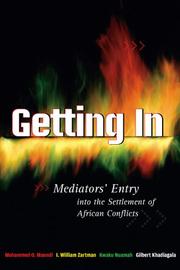
ISBN: 1929223625 9781929223626 Year: 2006 Publisher: Washington, D.C. United States Institute of Peace Press
Abstract | Keywords | Export | Availability | Bookmark
 Loading...
Loading...Choose an application
- Reference Manager
- EndNote
- RefWorks (Direct export to RefWorks)
Peaceful settlement of international disputes --- Internal politics --- Sub-Saharan Africa --- Mediation, International --- Political stability --- Médiation internationale --- Stabilité politique --- Case studies. --- History --- Cas, Etudes de --- Histoire --- Africa --- Afrique --- Politics and government --- Politique et gouvernement --- 856.3 Conflictbemiddeling --- 881 Afrika --- Destabilization (Political science) --- Political instability --- Stability, Political --- Consensus (Social sciences) --- Legitimacy of governments --- Conciliation, International --- International conciliation --- International mediation --- Mediation --- Arbitration (International law) --- Law and legislation --- Médiation internationale --- Stabilité politique --- 856.3 Conflictbemiddeling/Onderhandelingstechnieken
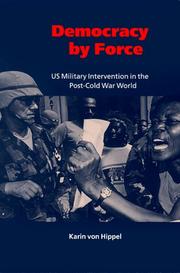
ISBN: 0521650518 0521659558 1107116848 0511172109 0511005083 0511150083 051132460X 0511491743 1280420502 051105209X 9780511005084 9780511150081 9780521650519 9780521659550 6610420505 9786610420506 9780511491740 Year: 2001 Volume: *1 Publisher: Cambridge Cambridge University Press
Abstract | Keywords | Export | Availability | Bookmark
 Loading...
Loading...Choose an application
- Reference Manager
- EndNote
- RefWorks (Direct export to RefWorks)
Since the end of the Cold War, the international community, and the USA in particular, has intervened in a series of civil conflicts around the world. In a number of cases, where actions such as economic sanctions or diplomatic pressures have failed, military interventions have been undertaken. This 1999 book examines four US-sponsored interventions (Panama, Somalia, Haiti and Bosnia), focusing on efforts to reconstruct the state which have followed military action. Such nation-building is vital if conflict is not to recur. In each of the four cases, Karin von Hippel considers the factors which led the USA to intervene, the path of military intervention, and the nation-building efforts which followed. The book seeks to provide a greater understanding of the successes and failures of US policy, to improve strategies for reconstruction, and to provide some insight into the conditions under which intervention and nation-building are likely to succeed.
International relations. Foreign policy --- United States --- Interventie (Internationaal recht) --- Interventie [Militaire ] --- Intervention (Droit international) --- Intervention (International law) --- Intervention [Military ] --- Intervention militaire --- Militaire interventie --- Military intervention --- 855.4 Militaire interventies --- 931 Internationale geschiedenis --- #A0109PO --- -Intervention (International law) --- Neutrality#A0109POUnited StatesForeign relations --- -Intervention (International law). --- -International relations. Foreign policy --- Foreign relations --- International law --- Intervention (International law). --- 1989 --- 841.1 Democratisering --- Koude oorlog --- Verenigde Staten --- Diplomacy --- Neutrality --- Social Sciences --- Political Science --- United States of America
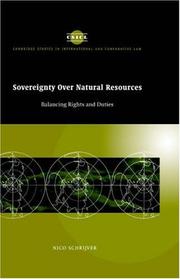
ISBN: 9780521562690 9780511560118 9780521047449 0511560117 0521562694 0521047447 Year: 1997 Volume: 4 Publisher: New York Cambridge University Press
Abstract | Keywords | Export | Availability | Bookmark
 Loading...
Loading...Choose an application
- Reference Manager
- EndNote
- RefWorks (Direct export to RefWorks)
In modern international law, permanent sovereignty over natural resources has come to entail duties as well as rights. This study analyses the evolution of permanent sovereignty from a political claim to a principle of international law, and examines its significance for a number of controversial issues such as people's rights, nationalization and environmental conservation. Although political discussion has long focused on the rights arising from permanent sovereignty, Dr Schrijver argues that this has been at the expense of the consideration of the corollary obligations it also entails. His book thus identifies directions sovereignty over natural resources has taken in an increasingly interdependent world and demonstrates its relevance to debate on foreign-investment regulation, the environment and sustainable development.
Natural resources --- Sovereignty. --- Government ownership --- Sovereignty --- State sovereignty (International relations) --- International law --- Political science --- Common heritage of mankind (International law) --- International relations --- Self-determination, National --- Environmental law --- Law and legislation. --- Law and legislation --- Natural resources - Law and legislation. --- Government ownership - Law and legislation. --- Environmental law, International --- Ressources naturelles --- Souveraineté --- Nationalisations --- Environnement (Droit international) --- Droit --- Economic policy and planning (general) --- Law --- natuurlijke grondstoffen --- General and Others
| Listing 1 - 10 of 37 | << page >> |
Sort by
|

 Search
Search Feedback
Feedback About UniCat
About UniCat  Help
Help News
News